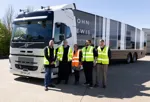By Eddie Stobart's HR director Angelina Miley
According to research by the Road Haulage Association, the average age of an LGV-licenced driver is now over 55, which demonstrates there is a lack of new talent joining a potentially aging workforce.
This is a major concern for the logistics and transportation sector as the supply chain remains critical to the success of the UK PLC.
Advancements in technology are also bringing major changes – from innovation in engine technology to how robotics and AI are used within warehouses.
It is therefore essential to work with the best partners and onboarding the right talent to ensure the industry is working with these changes (like the rapid growth of e-commerce and customer demand for shorter lead times), rather than responding to them retrospectively.
Safeguarding the flexibility and agility of the transport industry is a huge responsibility, and the industry needs to work collectively and collaboratively to help support skills requirements.
At Eddie Stobart, in-house training has been supplied to all our staff since 2011, however in 2017, we took the decision to open the doors of our Training Academy to the wider logistics and supply chain industry as a means of helping to find a workable solution for this challenge.
Executed correctly, training not only helps to improve the overall quality of existing talent, it can also bring new talent into the sector and help to redefine the benchmark for standards in the long-term.
But for such results to become a reality, training programmes must provide more than the basic essential requirements – whether that’s gaining more specialist qualifications, such as for the transportation of dangerous goods, or exploring new potential career paths in the industry.
Working closely with agencies such as the Department of Work and Pensions can also inform these efforts, for example, engaging with people who have previously been out of work.
It is incredible how many opportunities there are within this evolving sector and so it is important that work is done to promote what’s out there and to make sure these opportunities are as accessible as possible.
Apprenticeship schemes are another vital avenue for training people to gain the qualifications they need to be successful in transport and logistics – both for young people working to secure their first role and re-skilling experienced workers.
A big part of this is promoting the sector to students at schools and also focusing on how we can bring more diversity into the industry.
With 2019 looking set to bring profound change to the end-to-end logistics industry, training should remain a top priority. It is our ambition to make people more aware of the varied opportunities there are within the sector in the effort to drive recruitment and talent to the industry.
By improving access to training resources, the ambition is to not only improve overall industry standards, but also to enable drivers and other workers to proactively increase their individual skill set and talents to help them adapt to industry changes.


















Login to comment
Comments
No comments have been made yet.